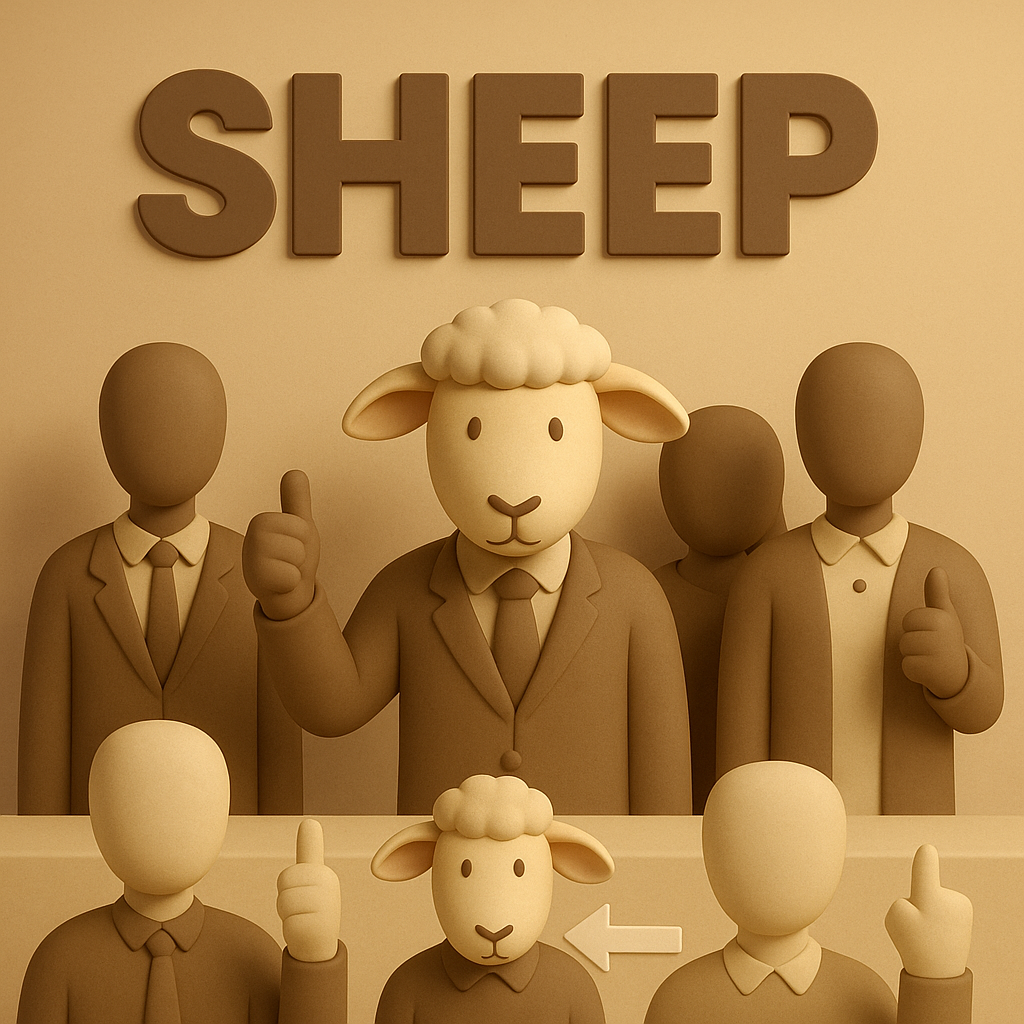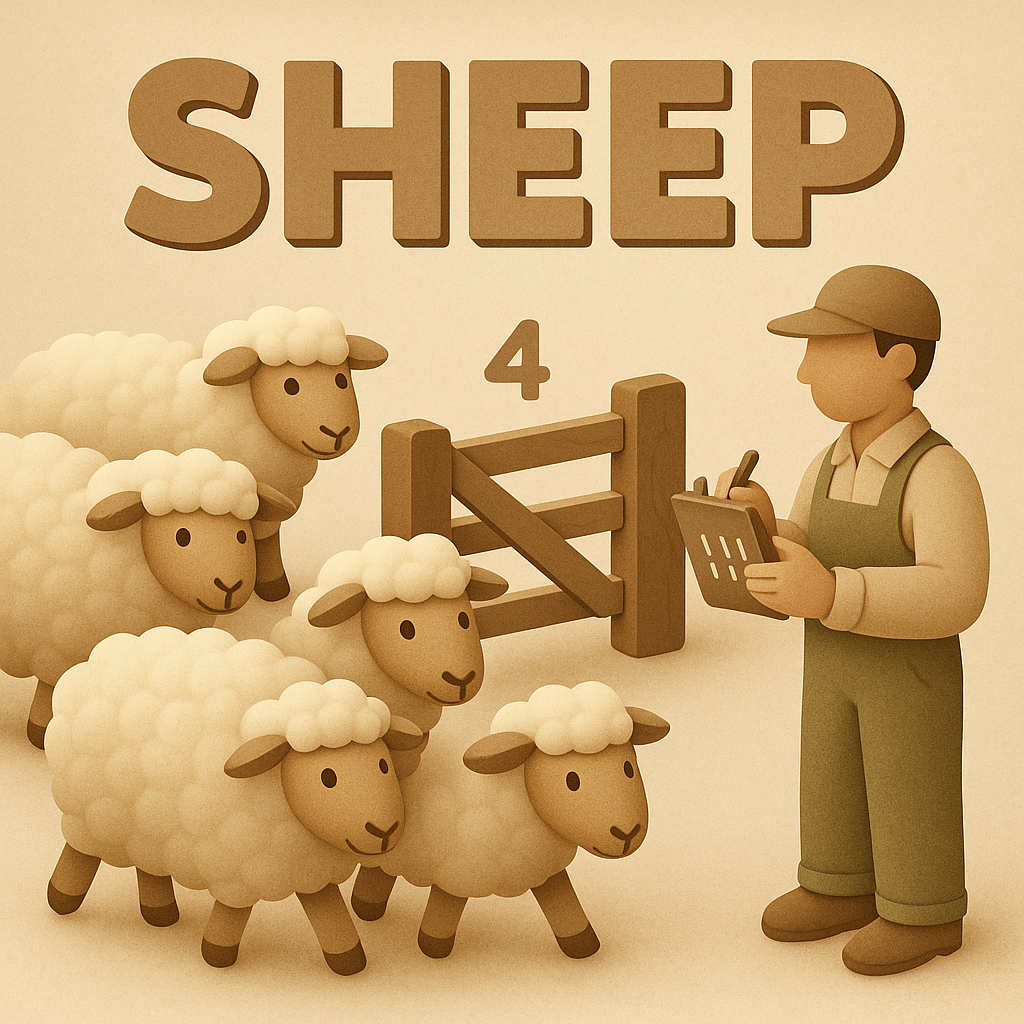Sheep
Definition
The word "sheep" refers to a domesticated ruminant animal (Ovis aries) raised for its wool, meat, and milk. It is also used metaphorically to describe people who are easily influenced or lack independent thought.
Parts of Speech
- Noun
Pronunciation
American English
- IPA Pronunciation: /ʃiːp/
- Respelling: SHEEP
British English
- IPA Pronunciation: /ʃiːp/
- Respelling: SHEEP
Etymology
The word "sheep" comes from Old English "sceap" or "scep," derived from Proto-Germanic "*skēpą." It shares roots with similar terms in other Germanic languages, such as Dutch "schaap" and German "Schaf," and is ultimately related to Proto-Indo-European "*skei-" meaning "to cut or split," possibly referring to shearing wool.
Derivatives
- Shepherd (noun)
- Sheepherding (noun/verb)
- Sheepskin (noun)
- Shearing (noun/verb)
- Sheepish (adjective)
Synonyms
- Ovine
- Lamb (young sheep)
- Ewe (female sheep)
Antonyms
- None
Usage
The term "sheep" is used both literally and metaphorically. Literal usage includes: "The farmer raises sheep for their wool." Metaphorical usage includes: "He followed the crowd like a sheep."
Related Terms
- Flock: A group of sheep.
- Pasture: Land used for grazing animals like sheep.
- Wool: The soft, curly hair of sheep used in textiles.
Detailed Definitions
Noun
- A domesticated animal raised for wool, meat, or milk: Refers to the ruminant animal commonly kept for agricultural purposes.
- Example: "The flock of sheep grazed in the field."
- A timid or easily influenced person: Used metaphorically to describe someone who follows others without question.
- Example: "He was called a sheep for always agreeing with the majority."
- Sheep as a collective noun: Refers to multiple animals of this species, as "sheep" does not have a separate plural form.
- Example: "The sheep were counted as they entered the pen."
sheep



🇨🇳 Mandarin
- 羊 (Farm Animal)
IPA Pronunciation: /jäŋ/
English Respelling: yáng
- 人云亦云的人 (Person too easily influenced or led)
IPA Pronunciation: /ɻən yʊn ji yʊn də ɻən/
English Respelling: rén yún yì yún de rén
🇮🇳 Hindi
- भेड़ (Farm Animal)
IPA Pronunciation: /bʱeːɽ/
English Respelling: bheḍ̄
- अनुसरण करने वाला (Person too easily influenced or led)
IPA Pronunciation: /ənʊsəɾən kəɾnə vaːlaː/
English Respelling: anusaran karne vala
🇪🇸 Spanish
- Oveja (Farm Animal)
IPA Pronunciation: /oˈβexa/
English Respelling: oveja
- Persona influenciable (Person too easily influenced or led)
IPA Pronunciation: /peɾˈsona influenθjaˈβle/
English Respelling: persona influenciable
🇫🇷 French
- Mouton (Farm Animal)
IPA Pronunciation: /mu.tɔ̃/
English Respelling: mouton
- Personne influençable (Person too easily influenced or led)
IPA Pronunciation: /pɛʁ.sɔn ɛ̃.flɥɑ̃.sabl/
English Respelling: personne influençable
🇸🇦 Arabic (Modern Standard Arabic)
- شَاة (Farm Animal)
IPA Pronunciation: /ʃaːh/
English Respelling: shaah
- شخص سهل التأثير عليه (Person too easily influenced or led)
IPA Pronunciation: /ʃaχs sahl al taʔthir ʕalayhi/
English Respelling: shakhs sahl al ta'thir 'alayh
🇧🇩 Bengali
- ভেদ (Farm Animal)
IPA Pronunciation: /bʱed̪/
English Respelling: bhēd
- সহজে প্রভাবিত ব্যক্তি (Person too easily influenced or led)
IPA Pronunciation: /ʃɔɦod͡ʒe proːbɦabito bɔkti/
English Respelling: sohoje probhābita byakti
🇷🇺 Russian
- Овца (Farm Animal)
IPA Pronunciation: /ˈofʲt͡sə/
English Respelling: ovtsa
- Влиятельная личность (Person too easily influenced or led)
IPA Pronunciation: /vlʲiˈjatʲelʲnaja ˈlʲit͡ɕnəstʲ/
English Respelling: vliyatel'naya lichnost'
🇵🇹 Portuguese
- Ovelha (Farm Animal)
IPA Pronunciation: /oˈvɛʎɐ/
English Respelling: ovelha
- Pessoa facilmente influenciável (Person too easily influenced or led)
IPA Pronunciation: /ˈpesɐ fɐˈsiʎ.mẽ.t͡ʃĩ.flwẽˈsi̯a.vɫ̩/
English Respelling: pessoa facilmente influenciável
🇮🇩 Indonesian
- Domba (Farm Animal)
IPA Pronunciation: /ˈdɔmba/
English Respelling: domba
- Orang yang mudah dipengaruhi (Person too easily influenced or led)
IPA Pronunciation: /ˈɔraŋ jaŋ ˈmuda di.pəŋaˈrui/
English Respelling: orang yang mudah dipengaruhi
🇩🇪 German
- Schaf (Farm Animal)
IPA Pronunciation: /ʃaːf/
English Respelling: schaf
- Leicht beeinflussbare Person (Person too easily influenced or led)
IPA Pronunciation: /laɪçt baɪɪnˈflʊsbaːrə pɛʁˈzoːn/
English Respelling: leicht beeinflussbare Person
🇯🇵 Japanese
- 羊 (Farm Animal)
IPA Pronunciation: /hitsuji/
English Respelling: hitsuji
- 影響を受けやすい人 (Person too easily influenced or led)
IPA Pronunciation: /eiˈkɔː o uˈke.ja.su.i hiˈto/
English Respelling: eikō o uke yasui hito
🇻🇳 Vietnamese
- Cừu (Farm Animal)
IPA Pronunciation: /kɨəw˧˩˧/
English Respelling: cừu
- Người dễ bị ảnh hưởng (Person too easily influenced or led)
IPA Pronunciation: /ŋʷi˧ˀ˥ je˧ˀ˥ ʔaːjŋ̟˧ˀ˥ hwə˧ˀ˥/
English Respelling: người dễ bị ảnh hưởng
🇰🇷 Korean
- 양 (Farm Animal)
IPA Pronunciation: /jaŋ/
English Respelling: yang
- 쉽게 영향 받는 사람 (Person too easily influenced or led)
IPA Pronunciation: /ʃip̚ke ɘjŋhjeŋ bad͡ɯn saɾam/
English Respelling: swipge yeonghyang badneun saram
🇹🇷 Turkish
- Koyun (Farm Animal)
IPA Pronunciation: /kojun/
English Respelling: koyun
- Kolayca etkilenebilen kişi (Person too easily influenced or led)
IPA Pronunciation: /koˈlajd͡ʒa etkiˈlenebiːlen kiˈsi/
English Respelling: kolayca etkilenebilen kişi
🇵🇰 Urdu
- بھیڑ (Farm Animal)
IPA Pronunciation: /bʱeːɽ/
English Respelling: bheṛ
- آسانی سے متاثر ہونے والا شخص (Person too easily influenced or led)
IPA Pronunciation: /ɑːsɑːniː seː mut̪ʰɑːsɪr ɦoːneː ʋɑːlɑː ʃʊxs/
English Respelling: aasani se mutasir hone wala shakhs





